Christopher Allen's Blog, page 3
April 8, 2018
Other Household Toxins Blog Tour
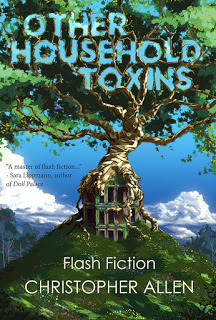 Hey, adorable IMBO readers! A lot is happening these days. First, you'll be happy to hear that submissions are open for the sixth annual I Must Be Off! Travel Writing Competition. Award-winning travel writer Mandy Huggins is our judge. I'm thrilled that she has time to read entries. She has TWO books out this year, so she's got to be crazy busy. Enter the competition early to avoid the entry fee!
Hey, adorable IMBO readers! A lot is happening these days. First, you'll be happy to hear that submissions are open for the sixth annual I Must Be Off! Travel Writing Competition. Award-winning travel writer Mandy Huggins is our judge. I'm thrilled that she has time to read entries. She has TWO books out this year, so she's got to be crazy busy. Enter the competition early to avoid the entry fee!My flash fiction collection, Other Household Toxins, came out in January. I love all the stories in the collection. I love the cover art. I love the reviews people have been writing. And I hope you love it too. If you live in the US, you can buy it on Amazon. If you live in the UK or anywhere else in the world, you can send me an email (christopher@imustbeoff.com) and I'll set you up with a signed copy. But I dawdle.
This post is meant to serve as the Mother Ship for all the blog interviews and reviews related to Other Household Toxins . I'll be revising this post when new interviews and reviews come in.
Sophie van Llewyn interviews me over at Nik Perring's blog.
Debbi Voisey interviews me on My Way By Moonlight
Helen Rye interviews me at Gatehouse Press
April Bradley writes a collage review of Other Household Toxins using only lines from the collection at Bending Genres.
I talk about Other Household Toxins, the UK Flash Fiction Festival in Bristol (July 20-22) and other things at the Flash Fiction Festival Blog.
Rupert Dastur interviews me at TSS Publishing.
More to come!
I must be off,
Christopher
___________________________________________
Christopher Allen is the author of Other Household Toxins (Matter Press) and Conversations with S. Teri O'Type (a Satire) . Allen's fiction has appeared, or is forthcoming, in [PANK], FRiGG, Eclectica Magazine's 20th-Anniversary Speculative anthology, Indiana Review, Night Train, Juked, SmokeLong Quarterly: the Best of the First Ten Years anthology, and Lunch Ticket, among many others. Read his book reviews in[PANK] blog, Necessary Fiction, Word Riot, and The Lit Pub. His creative non-fiction has been featured in Bootsnall Travel, Chicken Soup for the Soul and lots of other good places. A finalist at Glimmer Train in 2011, Allen is a multiple nominee for the Pushcart Prize, Best of the Net, The Best Small Fictions, storySouth's Million Writers Award and others. In 2017 Allen was both a finalist (as translator) and semifinalist for The Best Small Fictions. He is presently the managing editor of SmokeLong Quarterly and a consulting editor for The Best Small Fictions 2018.
Published on April 08, 2018 09:05
March 26, 2018
Announcing the Sixth Annual I Must Be Off! Travel Writing Competition!
It's that time of year again! Time to type up those travel articles, travel stories and travel reflections. We want to read about that place that changed you, about the experiences you can't wait to share with other travelers. Whether your work is humorous, informative, quirky or profound--if it's 1000 words or fewer, send it in.
Submissions are free until May 31; afterwards until the July 31 deadline there will be a nominal charge (see below). All proceeds from entry fees will go towards the prize money.
__________________
Previous Winners, Placers and Finalists:
"Forbidden Fruit" by Fiona Dixon (UK)"Old Foreigner" by Fiona Rintoul (UK)"A Hit in the Himalayas" by Scott Morley (US)"Straight in the Eye" by Mandy Huggins (UK)"We are Fire: the Dance of the Devils" by Michael Sealey (Spain)"Tea with Keiko" by Maria Howard (UK)"Wild Encounter" by Graham Mercer (UK, Tanzania)"The Seven Headless Dwarfs" by Matthew Wolfe (US)"A Kiss of Oranges and Myrtle on Crete" by Mihaela Lica Butler"A Leaf on the Wind" by Joel Hindson (UK)"Burning My Boots in Cabo Fisterra" by Gabriella Brand (US)"Discovering Hến Rice in Central Việt Nam" by Chris Galvin (Canada, Vietnam)
"Oh, Calcutta" by Paola Fornari (Tanzania, now Ghana)"The Scarlet Mile" by Gillian Brown (UK, now France)"Bodrum, Turkey's San Tropez" by Jack Scott (Australia, now Turkey)"The Children of Chitwan, Nepal" by Hannah Thompson-Yates (UK, now Hong Kong)"God's Own Country" by Saahil Acharya (India)
The 2018 Judge -- Mandy Huggins
Mandy was brought up in Scarborough, where her parents taught her the importance of kindness, stories, travel and good wine. She moved to London in the 1990s and now lives in West Yorkshire.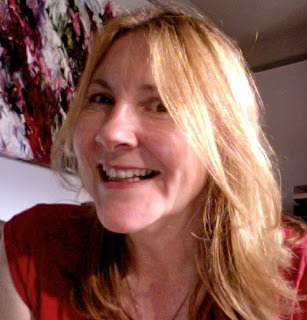 Her short stories, travel writing and feature articles have been published in a number of literary journals, textbooks, guidebooks and small press anthologies, as well as in the magazines and newspapers such as The Guardian, The Daily Telegraph, Reader's Digest, Mslexia, Traveller, Wanderlust and Writers' Forum.
Her short stories, travel writing and feature articles have been published in a number of literary journals, textbooks, guidebooks and small press anthologies, as well as in the magazines and newspapers such as The Guardian, The Daily Telegraph, Reader's Digest, Mslexia, Traveller, Wanderlust and Writers' Forum.
She has won a number of writing competitions and been placed and shortlisted in numerous others, including Bare Fiction, InkTears, Bradt Travel Guides, Cinnamon Press, Retreat West, New Writer, Fish, English Pen, Flash500, Words with Jam, and Writers' Forum. In 2014 she won the British Guild of Travel Writers New Travel Writer Award.
She appeared on BBC radio in 2012 after submitting a piece for the Your Desert Island Discs programme, and her written feature was one of three chosen for the BBC website.
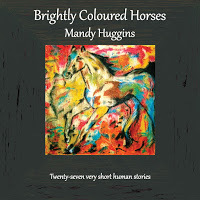 In 2017 a selection of her short fiction appeared in the InkTears showcase anthology, Death of a Superhero, alongside the work of three other writers.
In 2017 a selection of her short fiction appeared in the InkTears showcase anthology, Death of a Superhero, alongside the work of three other writers.
Her single-author flash fiction collection, Brightly Coloured Horses , was published by Chapeltown Books in February 2018 and has already received fifteen 5-star reviews. Her first full-length short story collection, Separated From the Sea, will be published by Retreat West in June.
Submission Guidelines:Maximum 1000 words, in EnglishEdited for spelling, grammar and punctuationPreviously unpublished work only! Blog posts are considered published.No entry fee until May 31. Simply send your entry to christopher@imustbeoff.com with TRAVEL WRITING COMPETITION as the subject. To enter the competition from June 1 to July 31, follow these two easy steps: Step One: Using PayPal pay €4 fee to christopher@imustbeoff.com through "send money to friends and family" (This is not a business.)Step Two: Email your travel piece and your 50-word bio in the body of the email or attached to the email. Please put TRAVEL WRITING CONTEST in the subject field. Send to: christopher@imustbeoff.com You will receive a confirmation from I Must Be Off! that your submission has been received and that you have been entered into the competition. This is not an automatic notification, so please be patient if it takes a few hours.Open to anyone worldwide, but you must have (access to) a PayPal account if you enter after May 31 and in case you win.One entry per person until May 31. From June 1 to July 31, you may enter as many times as you like. Each entry must be accompanied by an entry fee, €4 each.Deadline for submissions: July 31, 2018Entries will be read blind by this year's judge and award-winning travel writer, Mandy Higgins. It is not necessary to delete identifying information from your entry. If your name appears anywhere, it will be removed before being forwarded to the judge.Word doc, docx and rtf files only.Simultaneous submissions accepted but please contact I Must Be Off! (christopher@imustbeoff.com) immediately upon acceptance elsewhere. Entry fees cannot be refunded. Finalists announced at the end of August. Winners announced and published in autumn 2018.
The Prizes: The Top entries will be published at I Must Be Off! with authors' permission. Authors retain copyright.First place prize: €300Second place prize: €50Readers' Choice Award: €50 based on unique hits and comments tallied on October 30.
Good luck and happy writing!
I must be off,
Christopher
_________________________________________
Christopher Allen is the author of Other Household Toxins (Matter Press) and Conversations with S. Teri O'Type (a Satire) . Allen's fiction has appeared, or is forthcoming, in [PANK], FRiGG, Eclectica Magazine's 20th-Anniversary Speculative anthology, Indiana Review, Night Train, Juked, SmokeLong Quarterly: the Best of the First Ten Years anthology, and Lunch Ticket, among many others. Read his book reviews in [PANK] blog, Necessary Fiction, Word Riot, and The Lit Pub. His creative non-fiction has been featured in Bootsnall Travel, Chicken Soup for the Soul and lots of other good places. A finalist at Glimmer Train in 2011, Allen is a multiple nominee for the Pushcart Prize, Best of the Net, The Best Small Fictions, storySouth's Million Writers Award and others. In 2017 Allen was both a finalist (as translator) and semifinalist for The Best Small Fictions. He is presently the managing editor of SmokeLong Quarterly and a consulting editor for The Best Small Fictions 2018.
Submissions are free until May 31; afterwards until the July 31 deadline there will be a nominal charge (see below). All proceeds from entry fees will go towards the prize money.
__________________
Previous Winners, Placers and Finalists:
"Forbidden Fruit" by Fiona Dixon (UK)"Old Foreigner" by Fiona Rintoul (UK)"A Hit in the Himalayas" by Scott Morley (US)"Straight in the Eye" by Mandy Huggins (UK)"We are Fire: the Dance of the Devils" by Michael Sealey (Spain)"Tea with Keiko" by Maria Howard (UK)"Wild Encounter" by Graham Mercer (UK, Tanzania)"The Seven Headless Dwarfs" by Matthew Wolfe (US)"A Kiss of Oranges and Myrtle on Crete" by Mihaela Lica Butler"A Leaf on the Wind" by Joel Hindson (UK)"Burning My Boots in Cabo Fisterra" by Gabriella Brand (US)"Discovering Hến Rice in Central Việt Nam" by Chris Galvin (Canada, Vietnam)
"Oh, Calcutta" by Paola Fornari (Tanzania, now Ghana)"The Scarlet Mile" by Gillian Brown (UK, now France)"Bodrum, Turkey's San Tropez" by Jack Scott (Australia, now Turkey)"The Children of Chitwan, Nepal" by Hannah Thompson-Yates (UK, now Hong Kong)"God's Own Country" by Saahil Acharya (India)
The 2018 Judge -- Mandy Huggins
Mandy was brought up in Scarborough, where her parents taught her the importance of kindness, stories, travel and good wine. She moved to London in the 1990s and now lives in West Yorkshire.
 Her short stories, travel writing and feature articles have been published in a number of literary journals, textbooks, guidebooks and small press anthologies, as well as in the magazines and newspapers such as The Guardian, The Daily Telegraph, Reader's Digest, Mslexia, Traveller, Wanderlust and Writers' Forum.
Her short stories, travel writing and feature articles have been published in a number of literary journals, textbooks, guidebooks and small press anthologies, as well as in the magazines and newspapers such as The Guardian, The Daily Telegraph, Reader's Digest, Mslexia, Traveller, Wanderlust and Writers' Forum. She has won a number of writing competitions and been placed and shortlisted in numerous others, including Bare Fiction, InkTears, Bradt Travel Guides, Cinnamon Press, Retreat West, New Writer, Fish, English Pen, Flash500, Words with Jam, and Writers' Forum. In 2014 she won the British Guild of Travel Writers New Travel Writer Award.
She appeared on BBC radio in 2012 after submitting a piece for the Your Desert Island Discs programme, and her written feature was one of three chosen for the BBC website.
 In 2017 a selection of her short fiction appeared in the InkTears showcase anthology, Death of a Superhero, alongside the work of three other writers.
In 2017 a selection of her short fiction appeared in the InkTears showcase anthology, Death of a Superhero, alongside the work of three other writers. Her single-author flash fiction collection, Brightly Coloured Horses , was published by Chapeltown Books in February 2018 and has already received fifteen 5-star reviews. Her first full-length short story collection, Separated From the Sea, will be published by Retreat West in June.
Submission Guidelines:Maximum 1000 words, in EnglishEdited for spelling, grammar and punctuationPreviously unpublished work only! Blog posts are considered published.No entry fee until May 31. Simply send your entry to christopher@imustbeoff.com with TRAVEL WRITING COMPETITION as the subject. To enter the competition from June 1 to July 31, follow these two easy steps: Step One: Using PayPal pay €4 fee to christopher@imustbeoff.com through "send money to friends and family" (This is not a business.)Step Two: Email your travel piece and your 50-word bio in the body of the email or attached to the email. Please put TRAVEL WRITING CONTEST in the subject field. Send to: christopher@imustbeoff.com You will receive a confirmation from I Must Be Off! that your submission has been received and that you have been entered into the competition. This is not an automatic notification, so please be patient if it takes a few hours.Open to anyone worldwide, but you must have (access to) a PayPal account if you enter after May 31 and in case you win.One entry per person until May 31. From June 1 to July 31, you may enter as many times as you like. Each entry must be accompanied by an entry fee, €4 each.Deadline for submissions: July 31, 2018Entries will be read blind by this year's judge and award-winning travel writer, Mandy Higgins. It is not necessary to delete identifying information from your entry. If your name appears anywhere, it will be removed before being forwarded to the judge.Word doc, docx and rtf files only.Simultaneous submissions accepted but please contact I Must Be Off! (christopher@imustbeoff.com) immediately upon acceptance elsewhere. Entry fees cannot be refunded. Finalists announced at the end of August. Winners announced and published in autumn 2018.
The Prizes: The Top entries will be published at I Must Be Off! with authors' permission. Authors retain copyright.First place prize: €300Second place prize: €50Readers' Choice Award: €50 based on unique hits and comments tallied on October 30.
Good luck and happy writing!
I must be off,
Christopher
_________________________________________
Christopher Allen is the author of Other Household Toxins (Matter Press) and Conversations with S. Teri O'Type (a Satire) . Allen's fiction has appeared, or is forthcoming, in [PANK], FRiGG, Eclectica Magazine's 20th-Anniversary Speculative anthology, Indiana Review, Night Train, Juked, SmokeLong Quarterly: the Best of the First Ten Years anthology, and Lunch Ticket, among many others. Read his book reviews in [PANK] blog, Necessary Fiction, Word Riot, and The Lit Pub. His creative non-fiction has been featured in Bootsnall Travel, Chicken Soup for the Soul and lots of other good places. A finalist at Glimmer Train in 2011, Allen is a multiple nominee for the Pushcart Prize, Best of the Net, The Best Small Fictions, storySouth's Million Writers Award and others. In 2017 Allen was both a finalist (as translator) and semifinalist for The Best Small Fictions. He is presently the managing editor of SmokeLong Quarterly and a consulting editor for The Best Small Fictions 2018.
Published on March 26, 2018 05:35
February 25, 2018
Other Household Toxins Book Launch -- March 3!
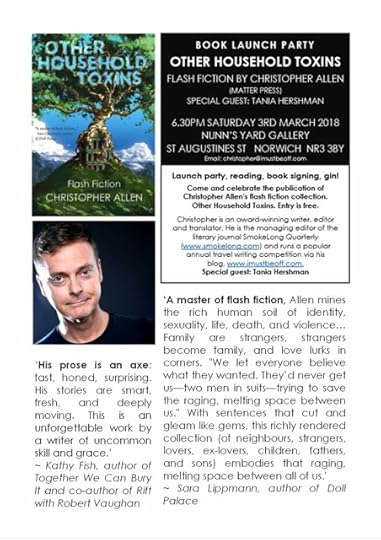 Hey, adorable IMBO readers! I've been busy. Recently, Matter Press published my flash fiction collection Other Household Toxins. The book is an eclectic grouping of 48 stories from the last 10 years. From magic realism to hyper-realism, I've tried to include a wide palette.
Hey, adorable IMBO readers! I've been busy. Recently, Matter Press published my flash fiction collection Other Household Toxins. The book is an eclectic grouping of 48 stories from the last 10 years. From magic realism to hyper-realism, I've tried to include a wide palette.On March 3, my friends in Norwich, UK are throwing me a party. This is such a wonderful thing. Everyone has been so helpful and so gracious, especially Helen Rye. If you live near Norwich, you are invited to come help us celebrate. And if you don't live near Norwich, no worries: parts of the event will be recorded and shared on Facebook.
I'm also thrilled to announce that my special guest for the evening will be my friend and fellow writer Tania Hershman. I'm very much looking forward to hearing her read on March 3 as well.
If you are interested in attending the launch, please send me a direct message and I'll make sure you're on the list. christopher@imustbeoff.com
Also, if you're attending AWP in Tampa, I will be there at the SmokeLong Quarterly table (T1748). So please stop by and say hello. My author signing in on Thursday, March 8 between 4 and 5pm.
I must be off,
Christopher
____________________________________________________
Christopher Allen is the managing editor at SmokeLong Quarterly. His debut flash fiction collection, Other Household Toxins , is available from Matter Press. Allen's fiction has appeared or is forthcoming in [PANK], Indiana Review, Juked, FRiGG, The Journal of Compressed Creative Arts and others. Read his book reviews in Necessary Fiction, The Lit Pub, Fiction Southeast and others. In 2017 Allen was both a finalist (as translator) and semifinalist for The Best Small Fictions. He lives somewhere in Europe--for now.
Published on February 25, 2018 03:19
January 30, 2018
Other Household Toxins is here!
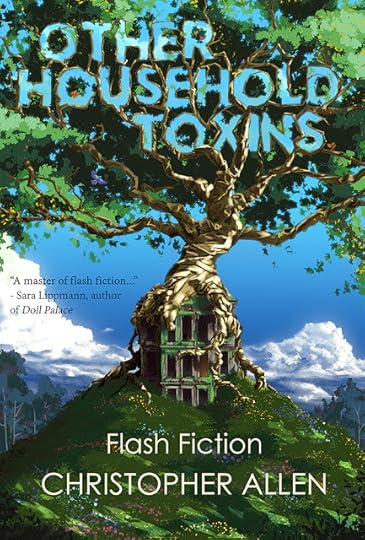 I'm excited. The stories in Other Household Toxins have been accumulating for the last 10 years. The collection is an eclectic grouping of flash fiction. From magic realism to in-your-face realism, and everything in between--surrealism, absurdism, hyper-realism (and more -isms)--the collection has something for everyone. I hope there'll be something you love among the 48 stories, but I'm also fairly sure there'll be something here that makes you squirm. Like life.
I'm excited. The stories in Other Household Toxins have been accumulating for the last 10 years. The collection is an eclectic grouping of flash fiction. From magic realism to in-your-face realism, and everything in between--surrealism, absurdism, hyper-realism (and more -isms)--the collection has something for everyone. I hope there'll be something you love among the 48 stories, but I'm also fairly sure there'll be something here that makes you squirm. Like life.I'm writing this post to thank all the people who have put some work into this collection. First of all, thank you to Randall Brown for believing in these stories and me. I think it goes without saying that Randall is a champion of, and a friend to, flash fiction writers. His website--Matter Press and The Journal of Compressed Creative Arts--was hacked last year. Randall lost everything. In the midst of all that stress he took on my project--so you try and find someone that supportive.
Jessica Gawinski did the cover art and design. She's a pro to work with. And we are thrilled with the cover.
To Kathy Fish, Sara Lippmann, Michelle Elvy, and Robert Vaughan: Your blurbs blew me away. I'm so grateful to all of you. Each one of you is a champion of flash fiction writers. I see many free drinks in your future.
To all the editors who believed in the previously published stories in the collection: Thank you for seeing something you loved in the story you accepted. You know--because I know you are all writers yourselves--what a great feeling it is to wake up to an acceptance (I live in Germany, so it's almost always a morning surprise). I'm also an editor, so I know the great feeling of accepting a story as well. It's like I'm Santa Claus, the Easter Bunny and Oprah all squished up together in cotton candy. And I see you nodding. It's a good feeling.
A special thank-you goes out to the editors of the following journals who either nominated my stories for awards or who GAVE my stories an award:
Blue Fifth Review nominated "The Shoes, The Girl, and the Waves that Washed Them Away" for the Pushcart Prize Anthology.
Indiana Review chose "When Susan Died the First Time" as a finalist in the 1/2 K competition.
The Journal of Compressed Creative Arts nominated "Everything We Had" for The Best Small Fictions and the Pushcart Prize Anthology. The story was a semifinalist for The Best Small Fictions.
"This Baring Daylight" was a co-winner of the Heat flash competition at AWP.
The Molotov Cocktail gave "Birdie's Knowledge of Signs" an honorable mention.
SmokeLong Quarterly nominated "When Chase Prays Chocolate" for the Pushcart Prize Anthology.
Ginosko Literary Journal gave "A Clown's Lips" its Flash Fiction Award.
Reflex Fiction long-listed "A Practiced Silence"
Eclectica Magazine included "Fred's Massive Sorrow" in it 20th-anniversary speculative anthology and also nominated the story for storySouth's Million Writers Award.
A-Minor Magazine nominated "Triangulation" for Best of the Net.
Bath Flash Fiction shortlisted "To Carry Her Home" and also entitled the anthology "To Carry Her Home," which is probably the sweetest thing that happened to me that year.
Thank you also to my SmokeLong Quarterly family, to the editors who commented on stories. Sometimes I think SmokeLong is like a 24/7 flash fiction workshop. Editing for SmokeLong is a privilege that I take very seriously.
My undying gratitude goes out to Gay Degani, Rupert Dastur, and Helen Rye who've conducted interviews.
Helen, by the way, is organizing my book launch in Norwich, UK on March 3. Thank you, Helen! And thank you to our special guest, Tania Hershman, whose prose has inspired me for a decade.
Finally, big hugs to all the people who will review Other Household Toxins. A couple of you I know about already (I'll add your names here once the review goes live), but let me take just a second to thank future reviewers on Amazon (cough, no reviews yet, cough) and Goodreads and other venues where quality reviews are appreciated. If you're the kind of wonderful who likes to write reviews for journals, let me know and I'll get you a pdf (honest reviews only, not looking for wildly positive commentary that no one will take seriously; I will always love you even if you hate my baby, you monster).
And to all the people who have bought the book already--and especially to those people who bought several of them!--I hope you love it. Well actually, I just hope you read it. The greatest gift you can give writers is to read their work. That's why I write: because no on listens to me when I talk.
I guess I should thank my husband for being very quiet while I try to write. Truth is, it's kind of difficult to get him to shut up sometimes. But he loves me. I'm so grateful for that.
I must be off,
Christopher
PS: Please Buy the Book :)
_____________________________________________
Christopher Allen is the managing editor at SmokeLong Quarterly. His debut flash fiction collection, Other Household Toxins , is available from Matter Press. Allen's fiction has appeared or is forthcoming in [PANK], Indiana Review, Juked, FRiGG, The Journal of Compressed Creative Arts and others. Read his book reviews in Necessary Fiction, The Lit Pub, Fiction Southeast and others. In 2017 Allen was both a finalist (as translator) and semifinalist for The Best Small Fictions. He lives somewhere in Europe--for now.
Published on January 30, 2018 08:00
November 9, 2017
The Readers Have Chosen!
 Congratulations to Mandy Huggins for winning the I Must Be Off! Readers' Choice Award in the 2017 I Must Be Off! Travel Writing Competition. In case you missed her entry, HERE it is for your enjoyment.
Congratulations to Mandy Huggins for winning the I Must Be Off! Readers' Choice Award in the 2017 I Must Be Off! Travel Writing Competition. In case you missed her entry, HERE it is for your enjoyment.I must be off,
Christopher
______________________________________________
Christopher Allen is the managing editor at SmokeLong Quarterly. His debut flash fiction collection, Other Household Toxins, is forthcoming from Matter Press. Allen's fiction has appeared or is forthcoming in [PANK], Indiana Review, Juked, FRiGG, The Journal of Compressed Creative Arts and others. Read his book reviews in Necessary Fiction, The Lit Pub, Fiction Southeast and others. In 2017 Allen was both a finalist (as translator) and semifinalist for The Best Small Fictions. He lives somewhere in Europe--for now.
Published on November 09, 2017 10:23
November 5, 2017
Other Household Toxins -- Cover Reveal
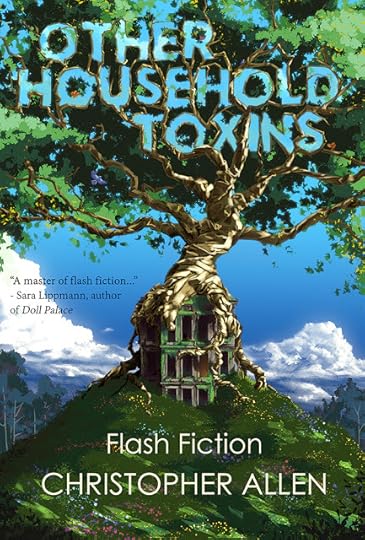
Jessica Gawinski is crazy talented. I'm thrilled that she did the cover for my debut collection of flash fiction, Other Household Toxins. This eclectic group of 48 stories from the past 7 years is my interpretation of flash fiction thus far. Many of the stories come and go on one page, and some push the (word) limitations of flash. One is even around 6000 words long but uses the techniques of flash to create a modular narrative. All of the stories are in some way about toxic relationships. And death. There is lots of death in Other Household Toxins, mostly in the form of characters re-interpreting it, re-inventing it, and deconstructing it.
Thank you also to the writers who've been supportive with blurbs, which I'll be sharing in the run-up to publication: Kathy Fish, Sara Lippmann, Robert Vaughan, and Michelle Elvy. And thank you to Randall Brown for believing in this collection.
The book is forthcoming from Matter Press--publication date TBA. And I'm dying for you to read it.
I must be off,
Christopher
Published on November 05, 2017 21:08
October 26, 2017
Forbidden Fruit by Fiona Dixon
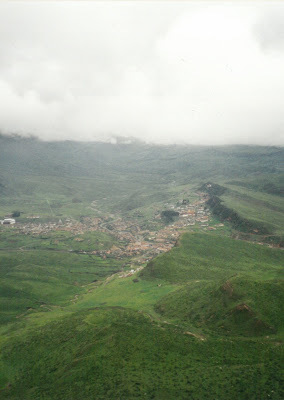 Whenever the rain stopped or slowed long enough for the mist to lift and reveal the steaming hills, I took to exploring.At the far edge of the settlement, past the family of black pygmy pot-bellied pigs, I began to climb the hill on the ridge that looked most accessible. It had been peering down at me through the inn windows for days and I wanted to see the view from the top. The air was clearer away from the smoking chimneys, and as I reached the summit I could see the rocks below and to the side of me were partly unearthed, slowly, slowly breaking through the vegetation. Above, the July rain-clouds hovered indiscriminately over the crease where Sìchuān and Gānsù meet. Beneath the rock I had chosen as my look-out post, the valley stretched out and in the middle lay Lángmùsì; scattered over the old river bed, straddling the unmarked border.
Whenever the rain stopped or slowed long enough for the mist to lift and reveal the steaming hills, I took to exploring.At the far edge of the settlement, past the family of black pygmy pot-bellied pigs, I began to climb the hill on the ridge that looked most accessible. It had been peering down at me through the inn windows for days and I wanted to see the view from the top. The air was clearer away from the smoking chimneys, and as I reached the summit I could see the rocks below and to the side of me were partly unearthed, slowly, slowly breaking through the vegetation. Above, the July rain-clouds hovered indiscriminately over the crease where Sìchuān and Gānsù meet. Beneath the rock I had chosen as my look-out post, the valley stretched out and in the middle lay Lángmùsì; scattered over the old river bed, straddling the unmarked border.Clusters of wood and clay-tiled roofs snuggled themselves, defying the elements, into the soft folds of the verdant green and cumin valley the river had left behind. The hills were their protection. The main street that ran through the centre of the village was a wide but muddy track. There were only one or two vehicles, ancient things, owned by those funded either by tourism or piety. Clothes were washed in the river. It was a thin place, where the layers of noise and busyness plastered so thickly in eastern cities were stripped away one by one. Here was a place you could breathe, where the rain forced you to hear your own thoughts and be still, allow yourself to become aware again. There were no streetlights and I loved walking at night under the endless black canopy that shone with a host of the brightest stars I have ever seen. All about me the sweet scent of wood-fires.
The street signs were dusty, like so much else about the place, but they were the same modern blue and white plaques found the country over. The only difference was that here, below the measured square Chinese characters was a round, swirling script with lines across the top. It was a predominantly Tibetan village of only a few thousand people. Like many rural places with only a handful of houses, one church and two pubs, Lángmùsì had four places of worship -- and no pubs -- that I’d noticed. No one seemed to know or care exactly where the dividing line was, but on the Gānsù side there was a Buddhist monastery whose monks followed the teachings of one Lama and on the Sìchuān side there was one whose monks were the disciples of another. A small convent housed nuns with shaven heads and grey robes. Separately, the Hui community were also served.
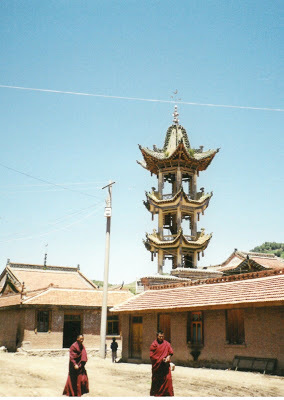 The Hui are mostly Muslim. I had been surprised to see the men with their close fitting caps and the women who concealed their hair in white cloths tied and folded neatly like square hats and did not cover their faces. Until then, I had thought the only Muslims in China lived in Xinjiang Uyghur Autonomous Region, where China borders Afghanistan, Kyrgyzstan and disputed Kashmir. In the Hui district I saw my first Chinese mosque. From a distance the minaret looked like a typical three-tiered pagoda, but getting closer the three metal crescents standing on top became visible. Also it was green: Islam’s holy colour. In this hollow between the hills Muslims observed the muezzin, while Buddhists turned a corridor of golden prayer-wheels and strings of coloured prayer flags petitioned in the wind.
The Hui are mostly Muslim. I had been surprised to see the men with their close fitting caps and the women who concealed their hair in white cloths tied and folded neatly like square hats and did not cover their faces. Until then, I had thought the only Muslims in China lived in Xinjiang Uyghur Autonomous Region, where China borders Afghanistan, Kyrgyzstan and disputed Kashmir. In the Hui district I saw my first Chinese mosque. From a distance the minaret looked like a typical three-tiered pagoda, but getting closer the three metal crescents standing on top became visible. Also it was green: Islam’s holy colour. In this hollow between the hills Muslims observed the muezzin, while Buddhists turned a corridor of golden prayer-wheels and strings of coloured prayer flags petitioned in the wind. Just as in the Garden of Eden where there was only one tree that could not be eaten from, there was only one hill in Lángmùsì where visitors were told not to go. It was the place where they brought their dead. Naturally, the villagers did not want tourists taking photos and interfering in their ceremonies or their grief. When a Tibetan died, their body was taken up the hill and after final rites, given to the birds. There were few trees on the hilltops, so they came from the forest. Of course they knew what was coming, what was expected of them. They came to release souls. I was told a person’s soul could not enter heaven, or the next cycle of reincarnation while it remained in the body. The birds broke apart the old vessel, setting the soul free to find the new or to leave the wheel altogether*. My Tibetan hosts noted each of these funerals. Once, I watched men and women dressed in layers: long boots and sheep-skin coats that wrapped around their waists held by decorated metal belts, coat-arms dangling or one arm in and one out as they walked to the hill. There must have been small processions to carry the bodies, but I never saw them. I worried about the numbers, in such a small population. At least eight people had died in the last ten days.
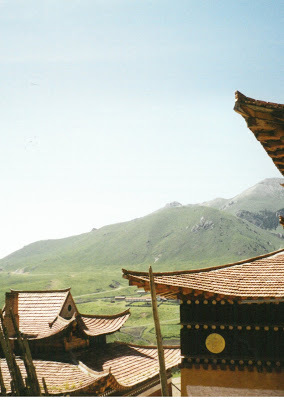 Sometimes it seemed that the east-west divide in China was greater than the one between Tibetans and Hui. There were few other foreigners besides myself and we saw little of one another. One morning a group of art students arrived from Beijing. Some of the locals shook their heads as they silently watched forty or so students in their fashionable outdoor clothes climb the hills, scrabbling wildly with their unwieldy easels trying to find a good spot to capture the landscape in graphite and paint. I was glad I had already made my ascent. The air changed; it felt a little heavier than before. The smiles on the shopkeepers’ faces grew tight and then disappeared.
Sometimes it seemed that the east-west divide in China was greater than the one between Tibetans and Hui. There were few other foreigners besides myself and we saw little of one another. One morning a group of art students arrived from Beijing. Some of the locals shook their heads as they silently watched forty or so students in their fashionable outdoor clothes climb the hills, scrabbling wildly with their unwieldy easels trying to find a good spot to capture the landscape in graphite and paint. I was glad I had already made my ascent. The air changed; it felt a little heavier than before. The smiles on the shopkeepers’ faces grew tight and then disappeared.The word had spread (perhaps on wings): the students knew about the ceremony for the dead. In brightly coloured waterproofs, backpacks full of snacks and paintbrushes and charcoal, they sought the forbidden fruit and climbed the sacred hill.
* Years later, I learnt this was known as a Sky Burial.
____________________________________________
Fiona Dixon, originally from Yorkshire, now living in Scotland, began her big adventure teaching English in China and went on to teach international students in the UK for over 6 years. She loves food, history, travel, and reading and is returning to writing after a period of the dreaded ‘block’.
"Forbidden Fruit" won first place in the 2017 I Must Be Off! Travel Writing Competition. The judge, Graham Mercer had the following to say about the piece:
'Although undramatic this article is an intriguing, well-written insight into the culture clashes that most travellers experience. Ironically the culture clash here occurs not between the foreign observer and the locals, or between Langmusi’s very different Tibetan/Muslim Hui inhabitants, but between the Tibetan locals and young, fellow-Chinese “intruders” from Beijing.
'The quality of the writing makes up for any lack of drama. I liked the economy of words and the freshness of some of the expressions – “It was a thin place”, a “green and cumin valley”, with, after the rain, “steaming hills”. And where, in the Buddhist area, “strings of coloured prayer flags petitioned in the wind”.
'And the writer is specific. To get to the viewpoint he/she has to go not just “left at the cross-roads” or “through the town centre” (as you might do anywhere) but “past the family of black pygmy pot-bellied pigs”. Meanwhile the street signs are “dusty” and the rain-clouds are not just rain-clouds but “July rain-clouds”.'
Published on October 26, 2017 07:00
October 19, 2017
Old Foreigner by Fiona Rintoul
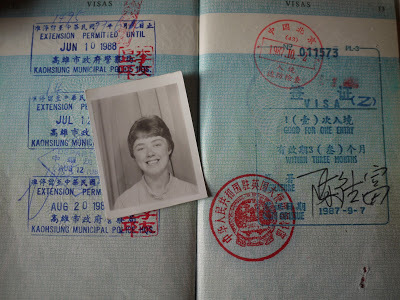 ‘They are dead,’ grinned Mrs Wu, who had met me at the airport.
‘They are dead,’ grinned Mrs Wu, who had met me at the airport.I looked out the minibus window. Four bloodied bodies lay on the road. Behind them, two vans, crushed like tin cans, were fused in a wonky embrace.The men were indeed dead but they hadn’t been for long. Their blood was as bright and shiny as fresh paint. I gaped at their small, strong bodies dressed in faded blue Mao suits and their wide, nut-brown faces. The institute director, Mr Li, was wearing a Mao suit too, but his was dark blue with a pen in the breast pocket, and his skin was the colour of parchment. I’d been in China less than four hours and already I’d been fumigated at Beijing Airport and confronted with dead bodies. The fumigation was to protect against AIDS, an illness found only in the decadent West. It was October 1987. The Tiananmen Square protests were 20 months away. China was in transition. Everyone I met during my year as an English teacher at the Tianjin Institute of Light Industry had been damaged by the Cultural Revolution, but the memories were starting to fade; a new China of skyscrapers, millionaires and one country, two systems was rising. On the drive from Beijing to Tianjin, I learnt a lot about the country that was to be my home for the next year. I learnt that life was cheap. That Chinese people laughed when they were frightened. That the roads were terrible. My God, the roads.‘You cycle too fast,’ Mr Li told me when, to his fury, I purchased a bicycle. The Tianjin roads were clogged with battalions of cyclists moving at a somnambulant pace. Dodging potholes, I wove in and out of them on my way from the institute to the city centre. That initial drive to Tianjin taught me something else too. In China, a foreigner cannot hide. When I put my face to the minibus window to rubberneck the dead bodies on the road, the crowd of onlookers immediately spotted me and turned from the corpses to stare at me. In China, it’s no ruder to stare at the living than at the dead. A man on the edge of the crowd gobbed noisily on the ground, his eyes fixed on my face. For the first time, I heard a phrase that was to define my stay: lao wai. It meant old foreigner. I’d come to China because I wanted to experience a different culture. I’m not sure what I expected but I think it had something to do with exotic food, music and landscapes. I didn’t expect to be an old foreigner. And I didn’t expect the institute staff to try to control my private life. When I spent a weekend in Beijing with an American boyfriend, I returned to find the place in uproar. I’d left without permission and could have been kidnapped, Mr Li told me. ‘It’s the weekend,’ I protested in my entitled Western way. ‘I can do what I like.’Doing what you liked was a concept unknown to my hosts. If I’d been a Chinese teacher, I couldn’t have travelled to Beijing without permission. At that time, a Chinese person needed a travel permit from their work unit to buy a train ticket or check into a guest house. Even with a travel permit, a Chinese woman couldn’t stay in a guest house with a boyfriend. People had to be married to share a room. This sexual prudishness was unexpected too. In post-Mao China, it was considered unseemly for a woman to show her collar bones. Premarital sex was taboo – and almost impossible. There was nowhere private to go, and people had to request contraception, which was only granted to married couples, from their work units. Before long, I felt under siege. My boyfriend wasn’t allowed to stay with me in my room at the institute. Instead, I was plagued by a constant stream of students, who visited me so that I wouldn’t be lonely. Lonely? I longed for time alone. When I didn’t answer their knock one evening, they stood on chairs and banged on the window above my door, waving excitedly. After that, I covered the window with newspaper. Anywhere else, I’d have gone out to escape them. But as soon as I stepped outside the compound gates, I felt staring eyes on me and heard the chant of lao wai. Even in freezing winter, when I cycled home in the dark swaddled in padded garments, a pollution mask pulled down over my nose and mouth, a chorus of lao wai pursued me as I swerved round passing carts of ‘night soil’ – human excrement used as fertiliser.One day, two teenage girls followed me in a local market. ‘Lao wai,’ they shrieked from behind their hands. ‘Lao wai. Lao wai.’ A red mist descended. Before I knew it, I had one of them by the lapels. Her terrified face was millimetres from mine when I came to my senses and let her go. Months later, I finally adjusted to my situation. I was on a rammed bus, travelling into town. The drumbeat of lao wai began, and something inside me snapped. I stood tall. ‘Yes, I am an old foreigner,’ I proclaimed in my sketchy Mandarin.In the horrified silence that followed, a little girl tapped me shyly on the arm and offered me a small plastic biro. As I accepted it, I wondered what I could give her in return. I’d heard Chinese children prized foreign stamps. I had a couple of British stamps in my purse. It seemed unlikely that the girl would want a second-class stamp she couldn’t use, but I took one out and gave it to her.
Her eyes opened wide. Never have I seen such innocent wonderment. We smiled, and the people on the bus smiled with us. For a moment at least, we were one.
______________________________________________________
Fiona Rintoul is a writer and translator. Her latest book, Whisky Island, celebrates the Isle of Islay’s whisky distilleries. Her novel, The Leipzig Affair, was short-listed in the Saltire awards and serialised on BBC R4’s Book at Bedtime. She is the translator of Outside Verdun by Arnold Zweig.
"Old Foreigner" won second place in the 2017 I Must Be Off! Travel Writing Competition. The judge, Graham Mercer, had the following to say about the piece:
'When you only have 1,000 words to play with it pays to grab the reader by the throat – and quickly. This writer does so in the first sentence. “They are dead”, grinned Mrs. Wu”. It isn’t just the “dead” that catches our attention but the fact that Mrs. Wu is grinning. 'For this single sentence encapsulates the article’s main theme, the often glaring, sometimes disturbing differences between cultures. The writer has already been “fumigated against AIDS” and witnessed a fatal road accident but worse still, in a “China in transition” after the Cultural Revolution, she finds herself in a country where “a foreigner cannot hide”, and where she is forever pointed out as “Lao wai!” – “old foreigner”. 'Most travellers who find themselves “trapped” (however voluntarily) in an alien culture will know the frustrations and tensions that this can cause - the author actually grabs one of her tormentors “by the lapels”. Fortunately the situation, fraught with unpleasant possibilities, is amicably resolved after the writer admits – in Mandarin – that she is indeed “an old foreigner”. A second-hand ball-point is exchanged for second-hand postage stamps. “And for a moment at least, we were one”. A satisfying solution and a pleasing ending to a well-written essay.'
Published on October 19, 2017 07:00
October 12, 2017
A Hit in the Himalayas by Scott Morley
 The descent from Tibet into Nepal is doubtless the most breathtaking truck ride one could ever experience. After a brief trip to Everest’s Rongbuk Monastery, days meandering across the dusty steppe surrounding Shigatse, Tibet, a crescent-shaped descent resembling half of an enormous funnel opens. The Land Rover plunges straight into it. Eventually you come to a dirt road that switchbacks over and over, down down down, what seems like fifteen sets of Rocky Mountains, and then back up again, and then back down, back up. Up and down over pass after pass, for more than twelve hours, before reaching Kathmandu.
The descent from Tibet into Nepal is doubtless the most breathtaking truck ride one could ever experience. After a brief trip to Everest’s Rongbuk Monastery, days meandering across the dusty steppe surrounding Shigatse, Tibet, a crescent-shaped descent resembling half of an enormous funnel opens. The Land Rover plunges straight into it. Eventually you come to a dirt road that switchbacks over and over, down down down, what seems like fifteen sets of Rocky Mountains, and then back up again, and then back down, back up. Up and down over pass after pass, for more than twelve hours, before reaching Kathmandu. As you descend, you cross narrow waterfalls plummeting into ravines less than a meter wide, yet so much deeper than the imagination. Next another waterfall and another ravine, only this time the Land Rover crosses a bamboo bridge into a misty emerald ravine of moss and fern gullies.
The pungent perfume of damp dirt replaces the dry dust and dung of Tibet, and your driver pulls over for a drag on his Kukri cigarette just before the short ride through an old avalanche with snow so dense it’s turned to an aqua ice. The truck moves through the rutted chasm with walls creaking against the sides of the truck, and your thankful there’s a back door on this machine. If you’re stuck that will be the one way out.
Swarthy Aryan looking Nepalese, small slender men with big brown eyes, curly lashes and aquiline noses replace the dung-dreadlocked, snot-encrusted goat herders of the plateau. They wear plaid pill hats and long scarves that cover their mouths and shoulders, and flutter gallantly in the glacial winds. Pretty soon you notice the goats here don’t munch clover like back home or barley like back in Tibet. Instead, it seems they’re eating marijuana. Whole forests of marijuana, as tall as Christmas trees.
Down below a curvy maiden with an ample brown bosom bathes naked in a silvery silted river gushing straight out of a hole in the hill, a hill with lovely little trails meandering this way and that over a panorama that just couldn’t get any more bucolic, Don Quixote be damned. You wait for Frodo to appear, barefoot and skipping along out of the glade with Merry and Pippin, or maybe Tom and Huck, or Brer Rabbit and Brer Bear. You look straight up and see an entire sky sparkling with icy diamond peaks that almost blind you in this high altitude sun. You think to yourself that you’ve truly found heaven on earth, and you’re so proud of yourself for making this trip, and you vow to never leave. You’ll marry a Gurkha girl, have big strong half-Asian children whom eventually you’ll send to the States – but you’ll never leave. Why leave? Everything is so perfect, after all.
Then you arrive in the no-man’s land, a kilometer-wide little town called Zhangmu. You load into the back of a pickup truck carrying men with red mustachios and women with gold chains hooked into their impressive Indian nostrils. You smell the garlic and curry and can’t wait to see the rest of this incredible country, Nepal.
At the end of the line, right before you line up for your honorary tourist visa, you notice a new song you’ve never heard before. A white rapper singing a song, “Without Me,” and you chuckle that the first time you get to hear Eminem is here, practically on top of the world really, so far from Los Angeles or Detroit. So far away from the world of hip-hop and everything else you once knew. The guy playing the music is selling Tupac and Biggie shirts. A young girl of about fifteen sells Bob and Ziggy Marley shirts.
A gust of wind blows one of the salesman’s shirts into the dirt and the Marley salesgirl goes to pick it up. But as she leans in to get it, the man comes up behind her at a full run and cold-cocks her directly in the jaw, knocking her unconscious, face down in the dirt. This doesn’t sit right with you so you grab the man’s shoulder. But as small as he is you can still feel the dense electricity of his musculature, the Gurkha musculature, and as he turns to you snarling you decide discretion is the better part of tourism.
Line up for your passport stamp. Nothing to see here.
______________________________________________
Scott Morely has a MFA in Creative Writing from Antioch University, Los Angeles. He earns his living teaching English in Busan, South Korea. Prior to returning to Busan, he taught in the United States, China, Turkey and Vietnam. He most recently published his short story “The Spittle Express” in Traveler’s Tales;Wake up and Smell the Shit.
"A Hit in the Himalayas" won third place in the 2017 I Must Be Off! Travel Writing Competition. The judge, Graham Mercer, had the following to say about the piece:
'There is something raw and unpolished about this “warts and all” article. It is, to be fair, about a raw and unpolished part of the world. But it holds the reader’s attention and some of the imagery is striking (though the “dung-dreadlocked, snot-encrusted goat herders” of Tibet might not be too impressed).
'The “dry dust and dung of Tibet” have already been mentioned, suggesting that the writer is not too unhappy about descending from the plateau “into a misty emerald ravine of moss and fern gullies”. But just as he (rightly or wrongly I imagine a young man) is thinking that he has “truly found heaven on earth” he discovers, as so many travellers do, that the grass on the other side of a border is not necessarily greener.
'“Grass” is appropriate, perhaps, for even the goats in Nepal feed on “whole forests of marijuana, as tall as Christmas trees”. And there is violence in this promised land, even before his passport has been stamped; good travel writing isn’t always about good experiences.'
Published on October 12, 2017 07:00
October 5, 2017
Straight in the Eye by Mandy Huggins
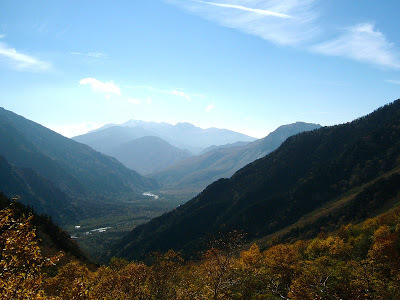 Motoki saw him before we did. Without uttering a sound he thrust out his arm to form a barrier, forcing us both to freeze mid-step as though competing in a game of musical statues. Just below the ridge a black bear sauntered towards us from the edge of the tree line, hoary-muzzled and sleek-furred.
Motoki saw him before we did. Without uttering a sound he thrust out his arm to form a barrier, forcing us both to freeze mid-step as though competing in a game of musical statues. Just below the ridge a black bear sauntered towards us from the edge of the tree line, hoary-muzzled and sleek-furred.Like most mountainous regions of Japan, Kamikochi has a healthy population of bears, but no one we spoke to had seen one here. We’d noticed signs that chalked up details of recent sightings: ‘None’, and offered safety advice: ‘Please walk with the bear bell for giving bear notice!’ However, despite the plethora of jangling kumayoke suzu for sale in the camping shop, we had set off unarmed, having decided that the constant clanking would disturb the birds we hoped to see, and scare off the elusive little mountain goats known as komoshika.
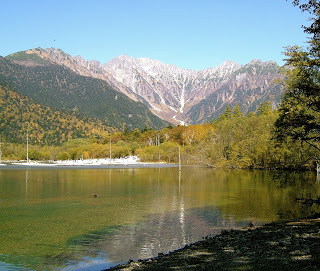 Our day’s climb started at Taisho Pond, where withered trees reach up out of the clear water; a reminder that this lake was formed a hundred years ago by the last eruption of Yakedake volcano. Kamikochi mountain valley is one of the most beguiling places in the Japanese Alps, and according to ancient legend it is where the sea god, Hotaka-no-Kami, descended to earth. The first recorded mountaineer here was the Buddhist priest, Banryu, and our climb traced his steps across the Azusa river and up to the lower ridges of the Hotaka mountains.
Our day’s climb started at Taisho Pond, where withered trees reach up out of the clear water; a reminder that this lake was formed a hundred years ago by the last eruption of Yakedake volcano. Kamikochi mountain valley is one of the most beguiling places in the Japanese Alps, and according to ancient legend it is where the sea god, Hotaka-no-Kami, descended to earth. The first recorded mountaineer here was the Buddhist priest, Banryu, and our climb traced his steps across the Azusa river and up to the lower ridges of the Hotaka mountains. We began our ascent through dense forests of larch and beech, following a trail marked by fluttering red ribbons tied haphazardly to branches and rocks. Shafts of sunlight pierced the canopy at intervals, intensifying the blaze of the autumn foliage and stirring the wings of late butterflies. Our footsteps were muffled by fresh leaf fall, and we breathed in the smell of damp, mossy earth. There was a sharp screech from above, a rustle of leaves and cracking twigs, and a family of macaques swung overhead.
As we climbed higher we heard distant birdsong and the tap-tap-tap of a pygmy woodpecker. There was a missed heartbeat as we crossed a narrow log bridge, gasping at the unexpected drop and the rush and tumble of white water cascading down the rock face. Eventually we cleared the tree line and scrambled up loose glacial scree, where the last alpine flowers clung tenaciously to the solid rock beneath. A bear bell tinkled faintly in the distance as a lone climber descended from the high ridge; a red splash against the grey of the rock.
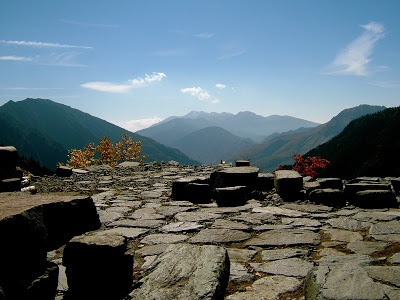 We reached the mountain hut, where a plateau of flat-topped stones formed a natural viewing platform; an excellent place to stop for our well-deserved drinks and rice snacks. Still high above us were the snow-capped peaks of Hotaka, and below us the river flowed like mercury through the valley. Barely perceptible wisps of white smoke hung in the still air above the sleeping fire-dragon of Yakedake volcano.
We reached the mountain hut, where a plateau of flat-topped stones formed a natural viewing platform; an excellent place to stop for our well-deserved drinks and rice snacks. Still high above us were the snow-capped peaks of Hotaka, and below us the river flowed like mercury through the valley. Barely perceptible wisps of white smoke hung in the still air above the sleeping fire-dragon of Yakedake volcano. As we gathered our belongings in readiness to leave, the climber finally arrived at the hut, waving a greeting and introducing himself as Motoki. He spoke little English, and our Japanese is basic, but when we ran out of vocabulary we communicated with nods and gestures. These quickly turned into wide smiles when he offered us warming shots of sake, which we gratefully exchanged for chunks of chocolate. We began our slow descent close on his heels, and in the companionable silence I contemplated the rejuvenating onsen baths that awaited us below and the promise of our evening camp fire.
Deep in thought, I was caught off guard when Motoki’s outstretched arm brought us to an abrupt standstill. As I looked up, my eye was caught by a dense black rock just above the tree line. It stood out against the pale scree, and when I re-focussed, the boulder became bear. I could make out the glint of his eyes, and the tilt and sway of his salt and pepper muzzle as he tried to catch our scent. When we stumbled to a halt there was a mesmeric moment as he continued to walk towards us. As he reared up onto his hind legs I swear he looked me straight in the eye; poised and sure; calmly weighing up his options. Then Motoki jangled the bells on his walking pole, and just as swiftly as he’d turned towards us, the bear dropped to the ground and loped away without looking back. Dizzy with adrenaline, we remained motionless until Motoki gestured back towards the path. I scrambled down after him, happy to forsake sightings of bashful goats and timid wagtails, and to listen instead to the clamorous clanking of bells until we reached our log cabin.
________________________________________________
Mandy Huggins has been published in a number of anthologies, travel guides, newspapers and magazines, and her first collection of flash fiction will be published later this year by Chapeltown.
Her travel writing has won several awards, including the British Guild of Travel Writers New Travel Writer Award in 2014.
"Straight in the Eye" was highly commended by Graham Mercer, the 2017 judge of the I Must Be Off! Travel Writing Competition. He had the following to say about "Straight in the Eye":
'This is a well-written evocation of a nature-lover’s hike in a spectacularly wild (if occasionally threatening) setting. Another judge might have awarded it first place and if pressed I might find it hard to explain why I didn’t do so. All I can say is that judges are human. And expected to make difficult and sometimes unpopular decisions. Whatever the case the writer, like the five others in this list, need have no concerns about his or her potential.
'In this piece he or she employs a device often used to great effect by writers of short articles and stories, beginning, as it were, with the ending. In this case the appearance of the black bear, which we don’t see again until the penultimate paragraph, thus maintaining suspense throughout the article.
'Meanwhile we are introduced to the quaint Japanese concept of the “bear bell”, a safety precaution that the writer and his or her companion(s) have (I am glad to say) ignored, so as not to disturb the other wildlife that they hope to see. As with all good travel articles we feel that we are there, amid the “snow-capped peaks of Hotaka” and “the sleeping fire-dragon of Yakedake”.'
Published on October 05, 2017 07:00



